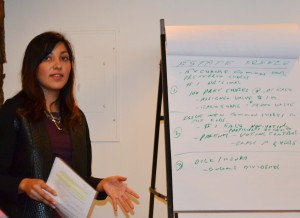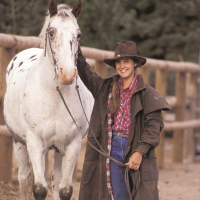One of the goals of New Farm Development Initiative is connect new farmers in the region with training opportunities and knowledgeable mentors. As part of this goal, we offer support to farm correspondents who wish to attend and travel to agriculture industry events. These correspondents assist us in linking to information and contacts available in our region and beyond and provide valuable insight into the value of attending such events.
About Sharon
Sharon Kerr is a former 4-H Extension Worker. For the past 47 years she has ranched in the Bulkley Valley with her husband, Harold. They are still actively ranching with their son Dallas and his wife, Laine. As retirement looms the Succession Planning workshop was a very timely event to assist them in planning for the future.
Learning About Succession Planning
Succession Planning workshops in Burns Lake and Smithers were facilitated by BC Ministry of Agriculture Agri Food Business Development Specialist, Clint Ellison, along with consultant Howard Joynt. John Stevenson, Skeena Region Agrologist was on hand providing local input. During the morning session Joynt and Ellison, guided participants through part one of the two part succession planning process by having the group develop a model farm/family and work through possible solutions to the transfer of the ownership.

Howard Joint, P.Ag. reviewing farm financials
Rules and laws affecting transfers were discussed as the group worked through the four step process.
- Collecting data: financial information, personal information, and other documents such as wills, agreements and leases.
- Review of critical issues: ownership, control, security, on farm living and equal vs equitable treatment of children.
- Setting goals: is it feasible to transfer the farm and secure the needs of parents and children?
- Succession planning tools: rollovers, Capital Gains, Capital Gains Reserves, Capital Gains Deductions and other tax issues, business arrangements, life interests, security, methods of owning property and will planning.
Discussions with an accountant and/or lawyer during part one was noted as possibly being helpful.

John Bakker, CGA, from Vandergaag & Bakker Certified General Accountants
The afternoon session covering part two of the succession planning process looked at the role accountants, financial advisors, lawyers and insurance agents might play in completing a succession plan. Accountant, John Bakker of Vandergaag and Bakker and Donald Giddings and Sonali Sharma of Giddings and Company law office discussed some options for dealing with the transfer of farms and farm assets.
It was emphasized that documents relating to the purchase of property and income tax records make it much easier and less costly for accountants and lawyers to assist with succession planning and the inter-generational transfer of land and assets. Bakker worked through an example of the transfer of milk quota.
Giddings noted there are several options in transferring assets. Under the Wills Variation Act, Giddings says spouses and children cannot be cut out of a will. If children are to be treated differently then an explanation of the distribution of assets with good reasons may help if adult children challenge a will. Trusts are an option to protect property and for those over 65 Alter Ego Trusts can be utilized to avoid challenges to a will.

Sonali Sharma, articling student with Giddings & Company Law Office
Sonali Sharma, articling student with Giddings briefed the group on the new Family Law Act that replaces the Family Relations Act. Under the new legislation a spouse is not automatically entitled to property held by the other spouse prior to the marriage. Property accumulated following a marriage is deemed to be family property. The death of a spouse and the re-marriage of the remaining partner can create issues but there are ways of coping with such situations.
In summing up the succession planning process it was emphasized that one of the biggest challenges is in covering off debt service while looking after the needs of parents and children. There is no right or wrong way and no “one size fits all” approach. It was noted that some bank products exist that could be helpful.
Succession planning can be an emotional process and a fairly complex project. It is among the specialized business planning services that are available to eligible farmers with 85% of costs up to $3,000 paid for through the BC Farm Business Advisory Services. E-mail: [email protected] or going to the Advisory Services Tab at: www.smartfarmbc.ca






